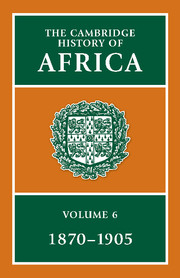Book contents
- Frontmatter
- Introduction
- 1 Africa on the Eve of Partition
- 2 The European Partition of Africa: Origins and Dynamics
- 3 North Africa
- 4 Western Africa, 1870–1886
- 5 Western Africa, 1886–1905
- 6 Western Equatorial Africa
- 7 Southern Africa, 1867–1886
- 8 Southern and Central Africa, 1886–1910
- 9 Portuguese Colonies and Madagascar
- 10 East Africa 1870–1905
- 11 The Nile Basin and the Eastern Horn, 1870–1908
- 12 The European Scramble and Conquest in African History
- Bibliographical Essays
- Bibliography
- Index
- Map 9 West Africa, c. 1870">
- Map 10 West Africa, c. 1905
- Map 13 The Congo Independent State
- Map 26 Ethiopia, the Nile Valley and the Horn in the era of Menelik II
- References
12 - The European Scramble and Conquest in African History
Published online by Cambridge University Press: 28 March 2008
- Frontmatter
- Introduction
- 1 Africa on the Eve of Partition
- 2 The European Partition of Africa: Origins and Dynamics
- 3 North Africa
- 4 Western Africa, 1870–1886
- 5 Western Africa, 1886–1905
- 6 Western Equatorial Africa
- 7 Southern Africa, 1867–1886
- 8 Southern and Central Africa, 1886–1910
- 9 Portuguese Colonies and Madagascar
- 10 East Africa 1870–1905
- 11 The Nile Basin and the Eastern Horn, 1870–1908
- 12 The European Scramble and Conquest in African History
- Bibliographical Essays
- Bibliography
- Index
- Map 9 West Africa, c. 1870">
- Map 10 West Africa, c. 1905
- Map 13 The Congo Independent State
- Map 26 Ethiopia, the Nile Valley and the Horn in the era of Menelik II
- References
Summary
African history has been too much dominated by blanket terms, generalisations which prompt comparisons rather than contrasts. For the sake of clarity Africa's historians have dealt in universal currencies, African despotism, an African mode of production, African nationalism, the African worker, and so on. Without common themes, it is true, differences would be impossible to define, and advances in understanding come from realisations that existing general models make an awkward fit for particular cases. Equally, historical shorthand can be a substitute for thought, and whole decades be passed off in a phrase. That has long been the case with ‘the scramble for Africa’ or ‘the colonial conquest’. It is the period of Africa's history which has been most written about and, almost for that very reason, perhaps the least actually understood, smothered in high abstraction and wide generality. Alien rule seemed to impose on Africa a crushing uniformity of rulers' intentions. But the querulousness of the particular has now been pressed long and insistently enough for this volume, and this chapter attempts a new synthesis more accommodating to the complex processes of time and the local spirits of place. Few Africans were easily crushed by conquest; and they proved thereafter to be but awkward subjects.
Partition and conquest together took a long time, much longer than the period covered by this volume. Almost a century elapsed between the French capture of Algiers in 1830 and the final defeat of Abd al-Karīm in the Rif mountains of neighbouring Morocco. The French employed wooden-walled sailing ships in the first enterprise, aeroplanes and tanks in the second.
Keywords
- Type
- Chapter
- Information
- The Cambridge History of Africa , pp. 680 - 766Publisher: Cambridge University PressPrint publication year: 1985
References
- 7
- Cited by

